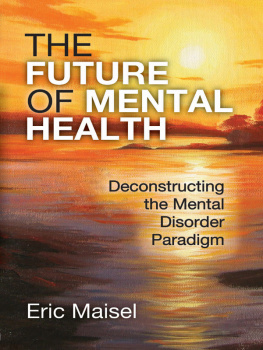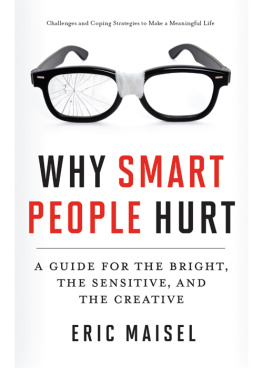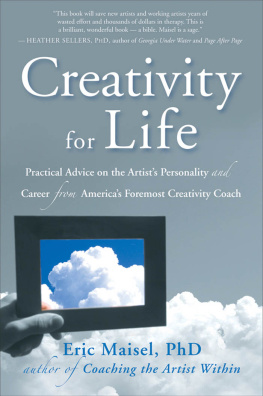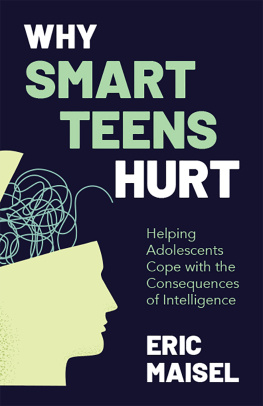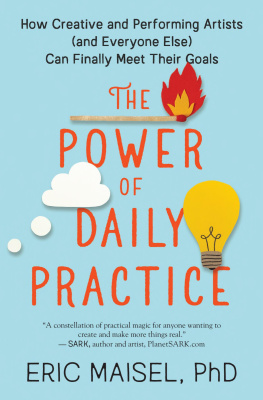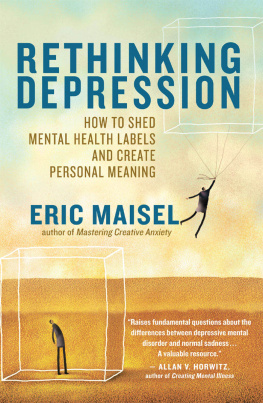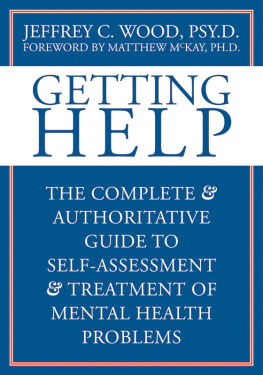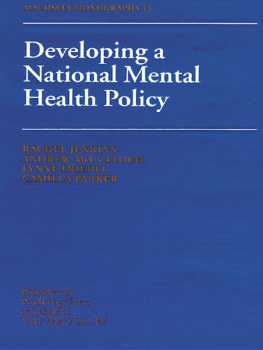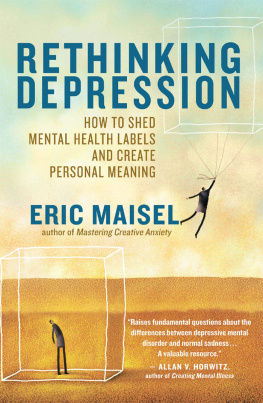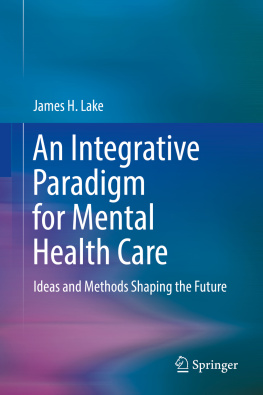
Copyright 2016 by Eric Maisel.
All rights reserved under International and Pan-American Copyright Conventions. No part of this book may be reproduced or transmitted in any form or by any means, electronic or mechanical, including photocopy, recording, or any information storage and retrieval system, without prior permission in writing from the publisher. All inquiries should be addressed to Transaction Publishers, 10 Corporate Place South, Suite 102, Piscataway, New Jersey 08854. www.transactionpub.com
This book is printed on acid-free paper that meets the American National Standard for Permanence of Paper for Printed Library Materials.
Library of Congress Catalog Number: 2015016606
ISBN: 978-1-4128-6261-5 (cloth); 978-1-4128-6249-3 (paper)
eBook: 978-1-4128-6204-2
Printed in the United States of America
Library of Congress Cataloging-in-Publication Data
Maisel, Eric, 1947
The future of mental health : deconstructing the mental disorder paradigm / Eric Maisel.
pages cm
Includes bibliographical references and index.
ISBN 978-1-4128-6261-5 -- ISBN 978-1-4128-6249-3 -- ISBN 978-1-4128-6204-2 1. Mental health. 2. Mental health services. 3. Mental health planning. I. Title.
RA790.6.M25 2015
362.2--dc23
2015016606
For Ann, as always
Contents
This book is intended for four audiences: mental health professionals, individuals suffering with emotional distress, parents of children who find themselves pulled into the world of the mental health establishment, and interested lay people who would like to learn more about our current crisis in mental health service provision, its roots, and its remedies.
For mental health professionals, Ill paint a picture of the movement they may want to make away from the current misguided practice of diagnosing and treating mental disorders. Ill show a way toward a wiser, truer, more humane, and more effective practice that focuses on a sufferers complaints and problems, formed personality, life experiences, current circumstances, and existential realities rather than on symptom pictures and the mechanical, illegitimate application of mental disorder labels.
For current practitioners, this is a hard stance to take due to the demands of managed care, the power of drug companies, the need for insurance reimbursement, inadequate and inappropriate training, a desire to maintain a chimerical prestige based on putative expertise, and their position of being firmly embedded inside a deceitful system. I will also propose a new mental health helper, someone I call a human experience specialist, who, not stuck and pressured in these ways, might offer new, better help to sufferers.
For individuals who are suffering, I want them to understand all of the following. First, they must realize that emotional distress, even severe emotional distress, is natural. It is not desirable, but it is natural. There is a vast difference, as different as conceptualizing the earth as flat versus round, between a brain being broken and a human being despairing. Right now we are operating with the flat earth version. It is your job as a suffering person not to accept some easy-to-swallow label that seems to explain your struggle but in reality explains nothing. Your job is to step to the plate as an investigator of your own painful situation.
Second, I want people who are suffering to understand steps that can help them: how it can help them to refuse to be labeled a patient; how it can help them to understand the difference between psychiatric medication and prescribed chemicals with powerful effects (effects they may in fact sometimes want); how it can help them to dispute the idea that normal and abnormal are sensible words; how it can help them to learn about institutions and communities of care that are radically different from the usual in-patient warehousing; and more. This is not the sort of help offered in self-help books. This is meta help: I want you to step back, survey the landscape, and better understand the basics.
As for parents, you have a new responsibility. Not only are you obliged to feed, clothe, and care for your children; not only is it your job to shower them with love, kindness and respect; not only is it your responsibility to teach them life skills and help them make sense of the world. You have a new job as well: watching out that you and your children arent victimized by the current mental health system and its wanton mental disorder labeling practices. It is your job to educate yourself about how the mental health establishment operates and decide if you believe its rationales for wanting to affix a mental disorder label to your child and begin him or her on so-called medication to treat a so-called disorder.
I also hope that interested laypeople, who may or may not be currently suffering, will nevertheless find these ideas eye-opening and may even be provoked to activism. There are many worthy causes to champion in life, and there is only so much that any individual can do. But by the same token, the emotional and mental health of our speciesand especially of our childrenis a cause worthy enough to rise to the top of any activist list. Your useful activism might be as simple as saying out loud, Does it really make sense that a five-year-old might find himself on two, three, or four psychiatric medications? Really? Even just some wide-eyed, noisy wondering might start to make a difference.
I would like to see a mental health revolution, and I intend to describe what the contours of that revolution might look like. In that regard, this is a manifesto, a cry for change, a plea on behalf of helpless children being fed pills at the drop of a diagnosis, and a demand that sufferers receive different and better help than that currently provided by the mental health establishment. Is such a revolution possible in the face of our entrenched ways, the power of invested parties, and a deep, culture-wide acceptance of the mental disorder model? Well, even kings have been toppled!
I am certainly not the only one writing about these ideas. In the suggested reading list at the end, you will find books with titles like The Myth of Mental Illness, Toxic Psychiatry, The Myth of the Chemical Cure, and many others. For half a century, a minority opinion has announced that mental health service provision has been corrupted by a pair of falsehoods, that mental disorders (as opposed to human suffering) exist, and that the way to treat these mental disorders is to act like they are akin to physical disorders and medicate the sufferer or act like they are not physical at all but psychological in nature and treatable through expert talk.
Many people have previously decried these as corrupt, flat-earth approaches to helping people who are suffering with mental and emotional pain. But for a variety of reasons, including the promulgation of a new mental health labeling catalogue called the DSM-5 (the Diagnostic and Statistical Manual of the American Psychiatric Association, Fifth Edition, which has taken a great deal of fire even from entrenched mental health professionals), the rapid increase of the labeling of children with so-called mental disorders, and the ever more brazen marketing by pharmaceutical companies of chemicals for every possible human difficulty, this is perhaps a new moment.
Let me say a word about the following. In this book, I argue that our current mental health practices are faulty. But I also make it quite clear, and spend a whole chapter on this subject, that difficult people are genuinely difficult. A dangerously crazy person can be a serious threat to others, and society has a legitimate right to protect itself from dangerous people. It is an issue up for serious debate as to whether we want to use chemicals to control dangerous folks.

